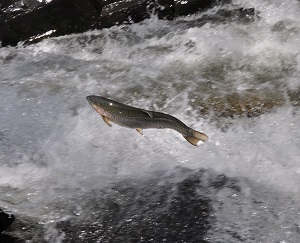Public Meeting July 24 on Fishing Regulations for Hatchery Cove in Grand Isle
GRAND ISLE,
Vt -- The Vermont Fish & Wildlife Department is hosting a public discussion
on landlocked salmon runs and possible fishing regulations at Hatchery Cove on
Tuesday, July 24, from 7:00 to 8:30 p.m. at the Lake Champlain Basin Program
conference room, 54 West Shore Road in Grand Isle, next to the Ed Weed Fish
Culture Station.
Brian
Chipman, fisheries biologist with Vermont Fish & Wildlife, will present
information on Lake Champlain salmon management and fishing at Hatchery
Cove. The cove is located off the outlet of Hatchery Brook, the Ed Weed
Fish Culture Station’s discharge stream. Chipman and other department
staff will discuss potential future fishing regulations to protect spawning
salmon at Hatchery Cove, answer questions and collect public comments on
potential regulation options.
By using
feral salmon (hatchery stocked fish that that have grown to maturity in Lake
Champlain) for broodstock, the department has found a much greater return in
spawning runs than by using hatchery reared-only adult broodstock.
“We may be
able to boost river runs of salmon--and associated fishing opportunities--by
maximizing spawning feral salmon as the primary egg source for hatchery
production and Lake Champlain stocking,” said Chipman.
The Ed
Weed Fish Culture Station rears and stocks all of Vermont’s landlocked Atlantic
salmon in Lake Champlain, approximately 145,000 yearling smolts each year.
“About
400,000 eggs are needed to reach our stocking goal, which would require
collecting 200 to 250 feral spawning pairs annually,” said Kevin Kelsey, the Ed
Weed Fish Culture Station supervisor.
While
Hatchery Brook has been closed to fishing for many years, heavy fishing
pressure and associated salmon take from fall spawning concentrations at
adjacent Hatchery Cove may be limiting the abundance of salmon available for
egg collection. Game wardens and hatchery staff have also noted illegal
activity and conflicts among anglers there. More restrictive regulations
will be considered to address these issues. This meeting will allow for
public discussion of the those concerns and potential solutions.
Reasonable
accommodations for persons with disabilities are available on request.
Please include a description of the accommodation you will need and your
contact information by sending an e-mail to penny.percival@vermont.gov
or by calling 802-828-1294 (direct voice) or 1-800-253-0191 (TTY).
For
Immediate Release: July 10, 2018
Media Contact: Brian Chipman; 802-879-5697


